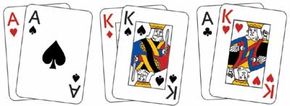Any poker veteran will tell you that to be a good player you must think about many different things during the game. In this article, we will discuss three important psychological concepts that can mean the difference between bluffing and getting bluffed: tilts, tells, and reading hands and situations. With the right amount of practice and skill, you, too, can become a master bluffer. Let's get the ball rolling with an examination of "tilts."
When players make mistakes because something upsets them emotionally, it is called a "tilt" or "being on a tilt." An example is a player who is a huge favorite in a hand but loses to an opponent who hits a miracle card (often called a "bad beat"). That player becomes so emotionally upset that he/she begins to make bad decisions. Another instance that sometimes puts players on a tilt is when an opponent is loud, obnoxious, rude, or otherwise annoying. Players who are on a tilt react in many different ways with the most common being betting with weaker hands than usual. While it's important to realize when one of your opponents is on a tilt, it is more important to realize when you may be going on a tilt and figuring out how not to let your emotions get the best of you.
Advertisement
Recognizing when you are going on a tilt is easier for some than others. If you think you may have played on tilt but aren't sure, one way that may help you is to keep detailed records of your playing sessions. Something else to watch out for is if you start to consider playing weaker hands than you usually play after taking a couple bad beats.
Once you realize that you are going on a tilt, you must, of course, try to avoid it. Some players can avoid tilting by simply suppressing their emotions and concentrating more on the game. If you are too upset, it may be best to simply quit your current playing session. Some players will get up and take a short walk to clear their head before returning to the game. Some find that fresh air also helps. Try different things when you go on a tilt until you find which one works best for you.
When one of your opponents is on a tilt, remember a few things as you try to take advantage of the situation. Players on a tilt are often unpredictable, especially when deciding their starting hand. Entering the pot (the total amount that has been bet in a single game) with weaker hands than usual is the most common thing players on a tilt do. Another thing to remember is that players may realize what they are doing and correct it at any time. In addition, solid players may be trying to convince you they are on a tilt when they are not. Deception in poker is a frequent occurrence.
It is important to remember not to play weak hands in order to take advantage of the player on a tilt. The fish may become so tempting to you that you become a fish yourself.
Very similar to tilts are "tells." In the next section, we will look at the signs that can reveal a player's hand, intentions or mood.
For more information on bluffing and other advice on how to win at poker, try the following tips:
- To see all of our articles on poker rules and advice, go to our main article on How To Play Poker.
- What are the chances your bluff will work? Stay a step ahead of your opponent by knowing How to Calculate Poker Odds.
- A successful bluff may depend on how much money you throw out. Choose the right amount with some Poker Betting Tips.
- When you've learned How to Play Poker in a Tournament, you'll be able to put your bluffing skills to the ultimate test.
Advertisement

